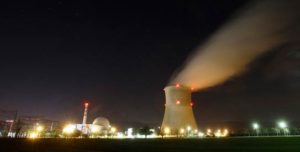by WorldTribune Staff, April 3, 2017
Saudi Arabia is expected to actively seek nuclear weapons capability to counter Iran, which continues to advance its own nuclear program despite the nuclear deal with world powers, a report said.
“Saudi Arabia is in the early stages of nuclear development” and will only become “more active” in seeking nuclear weapons, according to a March 31 report by the Institute for Science and International Security, a Washington D.C.-based organization that monitors global proliferation issues.

The Obama administration’s claim that the nuclear deal with Iran would ease regional tensions has not materialized. Instead, Iran has more aggressively backed its terror proxies since the deal and continues to harass U.S. military assets and allies in the region.
The nuclear deal “has also not eliminated the Kingdom’s desire for nuclear weapons capabilities and even nuclear weapons, but rather reduced the pressure on Saudi Arabia to match Iran’s nuclear weapons capabilities in the short term,” according to the institute’s report.
Saudi has already stated its intention to build at least 16 nuclear reactors in the coming years.
“There is little reason to doubt that Saudi Arabia will more actively seek nuclear weapons capabilities, motivated by its concerns about the ending of the [nuclear deal’s] major nuclear limitations starting after year 10 of the deal or sooner if the deal fails,” the report notes. “If Iran expands its enrichment capabilities, as it states it will do, Tehran will reduce nuclear breakout times, or the time needed to produce enough weapon-grade uranium for a nuclear weapon, to weeks and then days.”
“With these concerns, the Kingdom is likely to seek nuclear weapons capabilities as a hedge,” the report states.
As early as 2014, Saudi Arabia was pursuing the “scientific and engineering expertise necessary to take command of all aspects of the nuclear fuel cycle,” a European government official confirmed to the institute.
This type of research has taken place under the guise of a civilian nuclear program, according to the report, which did not find any evidence that Saudi Arabia has begun a clandestine weapons program.
“At this point in time and at its current pace of nuclear development, Saudi Arabia would require years to create the nuclear infrastructure needed to launch a nuclear weapons effort,” the report states, adding that the intention to achieve such a capability seems clear.
Right now, according to open source materials studied by the institute, “Saudi Arabia is concentrating on building up its civilian nuclear infrastructure” which includes acquiring nuclear facilities and partnering with nations such as Russia, South Korea, and China to exchange nuclear technology.
Saudi Arabia also is conducting research into civil nuclear capabilities and developing a multi-layered staff of nuclear engineers and scientists, according to the report.
“Saudi Arabia appears genuinely committed to importing many nuclear reactors and has pursued numerous cooperation agreements with other countries,” the report notes.
While its work is focused mainly on civilian nuclear uses, Saudi Arabia “appears on a trajectory to create domestic appendages that could provide a nuclear weapons capability, even if for some time these capabilities would likely be under international safeguards,” the report warns.
